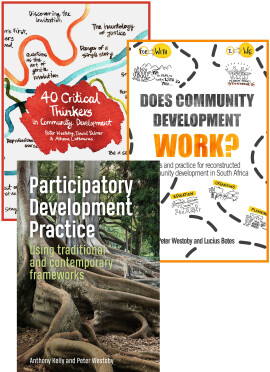
Indigenous Knowledge Development in Bangladesh
Present and Future
Development has failed to deliver on many of its promises to nations such as Bangladesh. Even worse, it stands accused sometimes of making matters worse, particularly for the poorest of the poor. The policies imposed from above by international agencies and central governments have been sadly at variance with the needs and aspirations of ordinary people. The development 'industry', concerned at evidence of the damage inflicted by its well-intentioned actions, has been searching for some time past for alternative approaches. Indigenous knowledge in development is one of the new approaches being pioneered. It is emerging within the context of increasingly popular participatory approaches. It works from below at the 'grassroots'. It aims to make local voices heard more effectively. If development is to continue to involve outside mediated interventions, in the belief that foreigners have knowledge and resources that can assist in relieving the degrading poverty endured by millions, the policymakers, scientists and bureaucrats need better to appreciate the indigenous view and practices both before and while intervening locally. While the aims of indigenous knowledge research are straightforward, their achievement presents us with some of the largest current challenges in development. It is an exciting time. The work has only recently started in earnest and a great deal remains to be accomplished. If you wish to see more equitable use of resources, this book is a must for you. Indeed, it should be compulsory reading for all those working in the development field.
Published: 2000
Pages: 260
eBook: 9781780445748
Paperback: 9781853395185
| List of Tables | |||
|---|---|---|---|
| List of Figures | |||
| Contributors | |||
| Foreword | |||
| Introduction | |||
| 1 The State of Indigenous Knowledge in Bangladesh 3 | |||
| 2 Indigenous Technical Knowledge: Unexplored Potential for Sustainable Development 23 | |||
| 3 Towards an Understanding of Indigenous Knowledge 27 | |||
| 4 Indigenous Knowledge and Sustainability: On the Brink of Disaster or Revolution? 31 | |||
| 5 Development Disasters: The Role of Indigenous Knowledge and Practices 37 | |||
| 6 Investigating Indigenous Knowledge: A Review of the Bangladeshi Literature on Natural Resources 41 | |||
| 7 Use of Indigenous Knowledge in the Sustainable Development of Bangladeshi Farm Forestry 57 | |||
| 8 Tree Pathology and Bangladeshi Agroforestry Practices 65 | |||
| 9 In Praise of the Indigenous Neem Tree 71 | |||
| 10 Indigenous Knowledge of Plant Use in a Hill Tracts Tribal Community and Its Role in Sustainable Development 75 | |||
| 11 Wild Vegetables: A Valuable Natural Resource for the Rural Poor 79 | |||
| 12 Local Vegetable Seed Storage Methods and Women's Participation in Development 91 | |||
| 13 Medicinal Plants for the Survival of Rural People 97 | |||
| 14 Indigenous Medicinal Plant Use, Sustainabilty and Biodiversity: Learning from the Grameen Bank Experience 107 | |||
| 15 Indigenous Knowledge of Fish and Fisheries: A Pilot Study 117 | |||
| 16 Freshwater Fisheries: Indigenous Knowledge and Issues of Sustainability 127 | |||
| 17 An Indigenously Developed Pond Aquaculture System 131 | |||
| 18 Indigenous Knowledge and Agricultural Research: Conflicts and Complementarities 139 | |||
| 19 Cultivating Indigenous Knowledge on Bangladeshi Soil: An Essay in Definition 145 | |||
| 20 Actors and Rural Livelihoods: Integrating Interdisciplinary Research and Local Knowledge 161 | |||
| 21 Databases, Indigenous Knowledge and Interdisciplinary Research 179 | |||
| 22 Indigenous Knowledge Fieldwork: Interaction with Natural Resource Scientists 197 | |||
| 23 When a Bangladeshi 'Native' is not a Bangladeshi 'Native' 203 | |||
| 24 The Bangladesh Resource Centre for Indigenous Knowledge and Its Network 213 | |||
| References 219 | |||
| Index 239 |
Paul Sillitoe
Paul Sillitoe is professor of Anthropology at the University of Durham, UK.
Ethnic and Cultural Dimensions of Knowledge
The Knowing in Indigenous Knowledge: Alternative Ways to View Development, Largely from a New Guinea Highlands’ Perspective
Sillitoe, Paul
2016
https://doi.org/10.1007/978-3-319-21900-4_7 [Citations: 4]Reciprocity and Its Practice in Social Research
An Extended Case of Reciprocity-in-Kind
2022
https://doi.org/10.4018/978-1-7998-9602-9.ch006 [Citations: 0]Traditional Knowledge and the Challenges of the Future
The Territorial Social Ecosystem as a Solution for the Transmission and Promotion of Traditional Knowledge
GRAVIÉ‐PLANDÉ, François
2025
https://doi.org/10.1002/9781394417926.ch17 [Citations: 0]How Vulnerable are Bangladesh's Indigenous People to Climate Change?
Gunter, Bernhard G.
Rahman, Atiq
Rahman, A. F. M. Ataur
(2008)
https://doi.org/10.2139/ssrn.1126441 [Citations: 10]Rural livelihoods in Sri Lanka: an indication of poverty?
Marzano, Mariella
Journal of International Development, Vol. 14 (2002), Iss. 6 P.817
https://doi.org/10.1002/jid.927 [Citations: 7]Trust in development: some implications of knowing in indigenous knowledge
Sillitoe, Paul
Journal of the Royal Anthropological Institute, Vol. 16 (2010), Iss. 1 P.12
https://doi.org/10.1111/j.1467-9655.2009.01594.x [Citations: 46]Flood Knowledge and Management in Bangladesh: Increasing Diversity, Complexity and Uncertainty
Cook, Brian R.
Geography Compass, Vol. 4 (2010), Iss. 7 P.750
https://doi.org/10.1111/j.1749-8198.2010.00327.x [Citations: 9]Who Knows? On the Importance of Identifying “Experts” When Researching Local Ecological Knowledge
Davis, Anthony
Wagner, John R.
Human Ecology, Vol. 31 (2003), Iss. 3 P.463
https://doi.org/10.1023/A:1025075923297 [Citations: 431]A critique of design methodologies appropriate to private-sector activity in development
Coward, Tim
Fathers, James
Development in Practice, Vol. 15 (2005), Iss. 3-4 P.451
https://doi.org/10.1080/09614520500076159 [Citations: 3]Problems of Defining and Validating Traditional Knowledge: A Historical Approach
Matsui, Kenichi
International Indigenous Policy Journal, Vol. 6 (2015), Iss. 2
https://doi.org/10.18584/iipj.2015.6.2.2 [Citations: 22]




